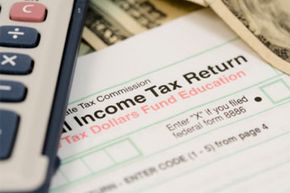Taxes — they are those pesky percentages tacked on to every dollar you spend, every dollar you earn and everything you own. As Benjamin Franklin once famously said, "...in this world, nothing can be said to be certain, except death and taxes." And it certainly seems that way, sometimes. But taxes can serve a very useful purpose — they help to run our government, and without them, many of the services we enjoy every day would not exist. The roads you drive on, the schools you attend and send your children to, the parks you have picnics in and even the hospitals you turn to when you're sick are all paid for, at least in part, by your tax dollars.
Most of the taxes you pay go to the federal government, but some go to the government of the state you live or work in. And depending on which state you call home, and how much money you make, the part of your income that belongs to the government can be really small or really big.
Advertisement
State governments get some of their operating money from the federal government, but most of the rest of the money they need to operate comes from taxes. State governments collect all kinds of taxes, many of which you probably know about (like sales tax) and some that you may never have heard of (like severance tax). But for many states, the largest source of revenue is income tax — a tax on any money that people or businesses in the state earn. Even though in this article we'll focus on the individual income tax — the tax on the earnings of individual people — keep in mind that businesses have to pay tax on the money they earn as well.
Income taxes can be pretty complicated, especially if you consider that many of the 50 states collect different types of income taxes, different rates of income taxes and some states collect no income tax at all. Each state even has its own rules about who is taxed and how they're taxed. So how can you make sense of it all? And what happens if you live in more than one state? Or join the military? Or have a really low income? Well, to answer these questions, we need to start at the beginning and understand what exactly the income tax is, well, taxing.
Advertisement





